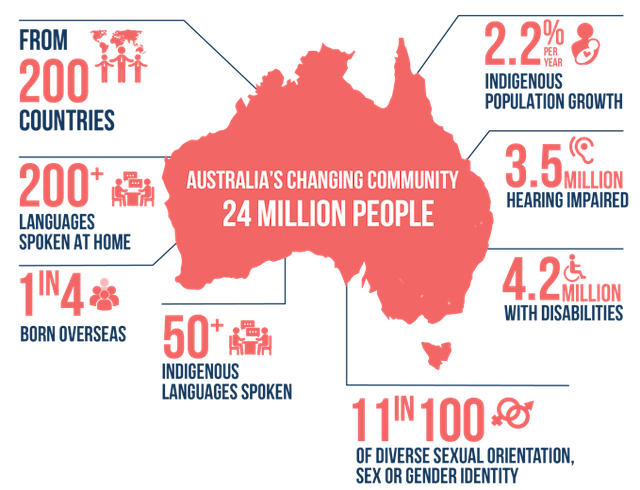
The sporting landscape has changed enormously in recent years. Government and community expectations for good governance, integrity, equality, member protection and child safeguarding means that providing safe, fair and inclusive sporting environments is no longer an aspiration, but an imperative.
The demographic of the communities in which sport operates has also changed dramatically: 25% of Australia’s population is born overseas, almost 50% have one parent born in other countries, 260 languages are spoken, one in five has a disability and over 50% are women and girls. Our culturally, linguistically and gender diverse communities are looking for sporting options that celebrate diversity, promote inclusion, and most importantly, make people feel like they belong.
What is Inclusion?
Inclusion is pro-active behaviours, options and actions to make people from all backgrounds, ages and abilities feel welcome, respected and that they belong at your club. Being inclusive is about following best practice for what sport should be so that everyone can get the most out of it.
What is Diversity?
Diversity is the mix of peoples’ different attributes and backgrounds (i.e. race, ethnicity, gender, age, disability, sexual orientation, religion). A good way to think about diversity is to think about your local community. Does your club reflect the diversity of your local community? Diversity is the mix of people, inclusion is trying to get this mix to all work together in harmony.

Making inclusion happen
Everyone should have the opportunity to be actively involved in whatever sport they choose, in whatever capacity they choose. Each sporting organisation should be committed to being inclusive and open to all members of the Australian community regardless of age, gender, disability, cultural or religious background or sexual orientation, or other attributes that may lead to any person feeling excluded or isolated.
But the reality is, a tale of missed opportunities still exists. Sports and clubs all over the country are missing out on entire groups of potential members, players, administrators and volunteers. More importantly, people who want to play sport feel, for a variety of reasons and barriers, excluded and don’t become involved. See some of the following barriers that exist:
Culturally and linguistically diverse populations
A love of sport can be found in people of different races, backgrounds and cultures. Yet this shared interest can raise a number of complex issues that involve balancing a person’s cultural traditions with their compliance with social norms and club rules and procedures.
Gender inclusion
Although people like to think of sport as being fair and open to all, sometimes individuals or groups are excluded or prevented from participating equally. If the unfair treatment is based on gender, then it could be sex discrimination.
Aboriginal and Torres Strait Islander peoples
Sport can provide a vital pathway to improving the social and economic wellbeing of Indigenous people and their communities, however many Indigenous sportspeople have had to overcome racial prejudices, stereotypes, biases and a lack of cultural awareness in order to excel at their chosen sport.
Homophobia and sexuality
Unfair treatment based on someone’s sexuality – or assumptions about their sexuality – is unfair discrimination and has no place in any sport and recreation environment. The good news is there are plenty of actions you can take to ensure that homophobia and sexuality discrimination does not exist at your club or association.
People with disability
Participation rates for people with disability are significantly lower than the general population. While attitudes and practices are changing there is still work to do. There are many practical ideas, tools and strategies you can use to ensure people with disability have every opportunity to participate in activities of their choice.
Race based inclusion
Racism can have a profound impact on people’s involvement in sport. It can affect motivation, enjoyment and levels of participation and, if unchecked, may result in inappropriate, potentially dangerous and violent behaviour. Racial harassment, discrimination and vilification have no place in Australian sport.
Religious vilification
The issue of religious vilification is on many sports’ radars with a growing number producing codes to stamp out racial and religious vilification. Yet it is only one aspect that needs to be addressed in improving the sporting environment for players with different religious belief.
What the law says
Policies and codes ensure that everyone in sport is aware of their legal and ethical rights and responsibilities, and provide the procedures to eliminate discrimination, harassment, child protection issues and other forms of inappropriate behaviour. These policies are backed up by federal and state/territory anti-discrimination laws that make discrimination and harassment unlawful in relation to a person’s gender, sexuality, disability, race, colour, national and ethnic origin, descent, ethnic or ethno-religious background in all areas of life, including sport. If you would like more information around legal and ethical rights and responsibilities you can download a copy of our Quick Reference Guide that will point you in the right direction.
The benefits of inclusion
Positioning your organisation as a champion of inclusion will:
- Enhance your brand and reputation.
- Ensure consistency in ‘walking the talk’ to meet your strategic objectives.
- Allow you to meet sport regulatory obligations.
- Increase governance and risk management and decrease potential legal risks.
- Increase membership.
- Increase pathway and participation opportunities.
- Increase sponsorship opportunities.
- Increase public support and volunteer base.
- Ensure greater publicity and positive public image.
- Provide a better connected and diverse sports community.
- Break down barriers and promote social inclusion.
For details on what you and your club can do to promote diversity and inclusion in your club and learn more about 7 Pillars of Inclusion click here.


